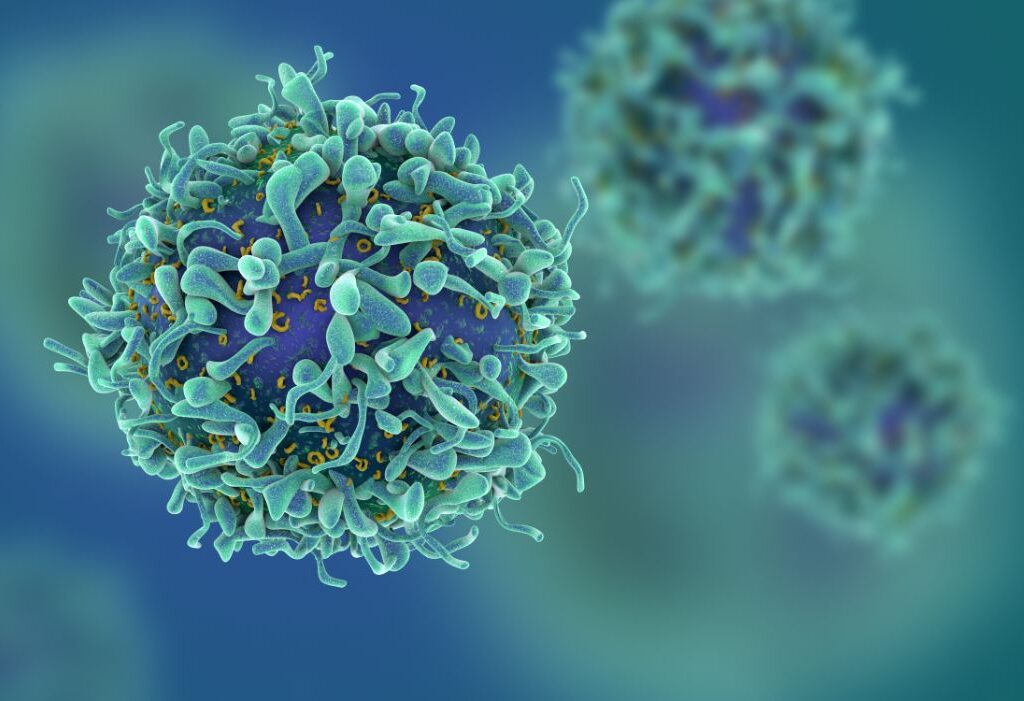Cancer is the leading cause of death in the world, according to the WHO. In Ecuador, according to the INEC, 29,273 new cases of cancer were registered in 2020. The most common types of cancer in the Ecuadorian population are: breast, prostate, colon, stomach, thyroid, cervical cancer, non-Hodgkin lymphoma, leukemia , lung and liver.
WHAT IS IT?

Cancer occurs when there is uncontrolled growth of abnormal cells in the body. According to the National Cancer Institute, it is possible for them to form tumors, which are lumps of tissue, which can be cancerous (malignant) or non-cancerous (benign). Cancerous tumors can invade nearby tissues and even travel to other parts of the body, this process is known as metastasis.
CAUSES
According to the Mayo Clinic, cancer is caused by mutations in DNA within cells. Within DNA there are a large number of genes, each containing a set of instructions. When there is an error in these, they cause the cell to stop its normal function, which turns it into a cancerous cell. According to the WHO, these alterations can appear due to genetic factors and three categories of external agents such as:
Physical carcinogens: Ultraviolet alterations and ionizing.
Chemical carcinogens: Substances contained in tobacco smoke and arsenic that may be present in water.
Biological carcinogens: Viruses, bacteria and parasites.
On the other hand, the chances of contracting cancer increase with age, because there is a loss of effectiveness of cellular repair mechanisms.
Additionally, alcohol consumption, unhealthy eating, lack of physical exercise and pollution are risk factors for contracting this disease.
TYPES OF CANCER
The National Cancer Institute indicates that there are more than 100 types. Frequently, the type of cancer is named after the organ in which it appears. Below, we will mention some of them, according to the Centers for Disease Control and Prevention (CDC).
Head and neck cancer: This includes those cancers that begin in different parts of the head and throat, without taking into account the eyes or the brain.
Colon cancer: Solca indicates that the incidence of colon cancer is 157.2 cases per 100,000 inhabitants. This type of cancer is still under investigation because its causes have not been clearly identified. What is known is that it begins when healthy colon cells suffer mutations in their DNA. When this happens the cell is damaged and becomes cancerous, as they accumulate they form a tumor.
Cervical cancer: During 2015 and 2020, 2,735 deaths and 10,011 cases of this type of cancer were recorded. One of its most common risk factors is the HPV virus (Human Papillomavirus), so the vaccine against this virus can help prevent this type of cancer.
Liver cancer: To reduce the risk of suffering from it, it is recommended to be vaccinated against hepatitis B, tested against hepatitis C and avoid excessive alcohol consumption.
Breast cancer: Breast cancer can be cured in more than 90% of cases if it is detected early. For this reason, it is suggested to have mammograms and visit the specialist periodically. The risk factors for this disease are: obesity, alcohol consumption, family history, exposure to radiation, tobacco consumption and hormonal or reproductive problems.
Skin cancer: Most cases are caused by excessive exposure to the sun's ultraviolet (UV) rays. To reduce your risk, it is recommended to apply sunscreen, as well as avoid prolonged exposure to the sun and tanning beds.
Prostate cancer: It is the most common type of tumor in men worldwide. According to Solca, in Ecuador the risk of developing it is 35.7 cases per 100,000 men. Among its most common causes are: family history and age; the older you are, the more likely you are to have a prostate tumor. According to Clinic Barcelona, 75 % of cases occur in men over 65 years of age.
Lung cancer: One cause of this type of cancer is tobacco consumption. Therefore, smoking should be avoided as well as exposure to the smoke of other smokers.
HOW TO PREVENT IT?
Healthy eating: This may reduce the risk of getting cancer. Therefore, it is suggested to consume fruits, vegetables and cereals. In addition to avoiding excessive consumption of refined sugar, animal fats and processed meats.
Do exercise: By maintaining a healthy weight you also reduce the risk of suffering from certain types of cancer such as: breast, lung, prostate, colon and kidney cancer. Mayo Clinic recommends doing at least 150 minutes of moderate aerobic activity during the week.
Take care of the sun: Skin cancer is one of the most common and also preventable. Therefore, it is important to avoid sun exposure from 10:00 a.m. to 4:00 p.m. Additionally, when going out it is appropriate to wear a hat, glasses and clothing that covers as much skin as possible. Also, it is suggested to use sunscreen, which should be reapplied every two hours.
Get vaccinated: Protecting yourself against certain viral infections can lower your risk of getting cancer. Therefore, it is important to attend a consultation so that the specialist doctor can analyze which vaccines should be given. For example, the Hepatitis B vaccine reduces the risk of developing liver cancer. While the vaccine against human papillomavirus (HPV), a sexually transmitted virus, helps reduce the possibility of suffering from uterine cancer. The U.S. Food and Drug Administration (FDA) recently approved the vaccine for use in men and women ages 9 to 45.
Avoid bad habits: Tobacco consumption is related to several types of cancer such as: lung, mouth, throat, larynx, bladder, pancreas, cervix and kidney. On the other hand, alcohol increases the risk of suffering from some types of cancer such as: breast, colon, lung, kidney and liver cancer.
Have a backup: Cancer treatment is usually expensive, so it is advisable to have a medicine plan that can accompany the patient in these cases.
Cancer can appear at any time, regardless of age, race or gender, and in these moments BMI is with you. Check out our wide variety of plans offered by BMI Unique, which includes international care. In fact, the MD Anderson Cancer Center hospital is part of its medical network and has received recognition as the best hospital to combat this disease in the United States. Learn more about our plans here: https://www.bmicos.com/ecuador/categoria-producto/bmi-del-ecuador/bmi-unique/
References:
Colon cancer – symptoms and causes – Mayo Clinic. (2022, October 8). https://www.mayoclinic.org/es/diseases-conditions/colon-cancer/symptoms-causes/syc-20353669
Causes of Prostate Cancer. (2019, May 6). Clinic Barcelona. https://www.clinicbarcelona.org/asistencia/enfermedades/cancer-de-prostata/causas-y-factores-de-riesgo
breast cancer. (sf). PAHO/WHO | Pan American Health Organization. https://www.paho.org/es/temas/cancer-mama#:~:text=Las%20caracter%C3%ADsticas%20que%20se%20asocian,hormonales%20y%20consumo%20de%20tabaco.
Lung cancer – symptoms and causes – Mayo Clinic. (2022, March 22). https://www.mayoclinic.org/es/diseases-conditions/lung-cancer/symptoms-causes/syc-20374620
Causes, risks and prevention of cervical cancer. (sf). National Cancer Institute. https://www.cancer.gov/espanol/tipos/cuello-uterino/causas-factores-riesgos-prevencion
Cancer – symptoms and causes – Mayo Clinic. (2022, December 7). https://www.mayoclinic.org/es/diseases-conditions/cancer/symptoms-causes/syc-20370588
Timely diagnosis and detection are key to improving the quality of life of cancer patients – Ministry of Public Health. (sf). https://www.salud.gob.ec/diagnostico-y-deteccion-oportunas-son-claves-para-detectar-el-cancer/
Cancer prevention: seven tips to reduce risks. (2023, March 18). Mayo Clinic. https://www.mayoclinic.org/es/healthy-lifestyle/adult-health/in-depth/cancer-prevention/art-20044816
What is cancer? (sf). National Cancer Institute. https://www.cancer.gov/espanol/cancer/naturaleza/que-es
What is skin cancer? (2023, April 18). Centers for Disease Control and Prevention. https://www.cdc.gov/spanish/cancer/skin/basic_info/what-is-skin-cancer.htm#:~:text=La%20mayor%C3%ADa%20de%20los%20casos,bronceadoras%20o%20las%20l%C3%A1mparas%20solares.
Types of cancer | CDC. (sf). https://www.cdc.gov/spanish/cancer/kinds.htm
World Health Organization: WHO. (2022, February 3). Cancer. https://www.who.int/es/news-room/fact-sheets/detail/cancer













